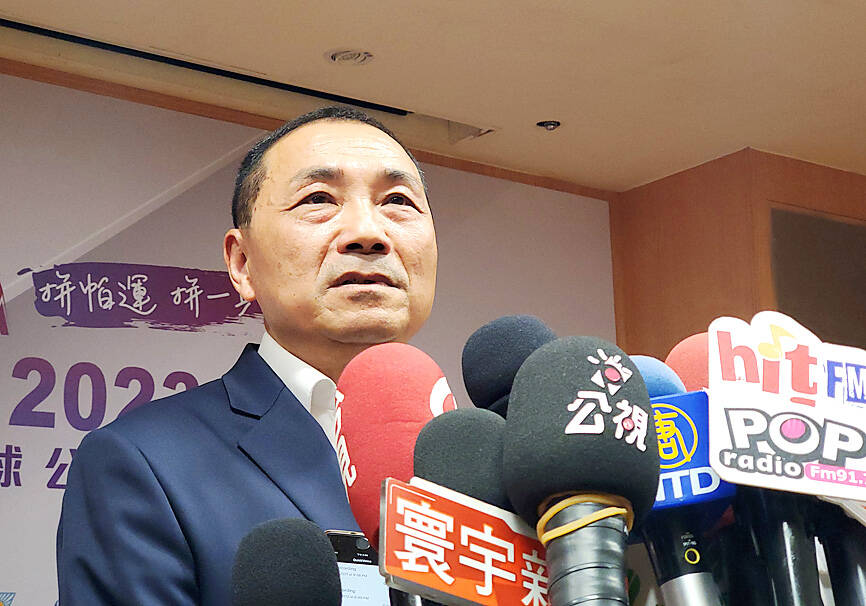New Taipei City Mayor Hou You-yi (侯友宜) on Monday said that if elected president, he would return compulsory military service to four months as long as he was sure there was stability and peace in the Taiwan Strait.
Hou — the Chinese Nationalist Party’s (KMT) presidential candidate — told TVBS political talk show host Chao Shao-kang (趙少康) in an interview that his basic position was that cross-strait ties were of the highest priority and that stability in the Taiwan Strait would determine how military service is handled.
The cross-strait relationship has become dangerous under the Democratic Progressive Party (DPP) government and it had no choice but to extend compulsory military service to one year starting next year, he said.

Photo: CNA
If elected, he would work toward securing stability and peace in the Taiwan Strait and once the goal was achieved, cut the one-year service back to four months, he said.
He did not elaborate on what specifically would be necessary for him to be convinced that “stability” and “peace” had been achieved.
President Tsai Ing-wen (蔡英文) on Dec. 27 last year announced that from Jan. 1 next year, Taiwanese men born after Dec. 31, 2004, would need to serve one year of military service as part of Taiwan’s military force restructuring plan to bolster its combat readiness in the face of the Chinese military threat.
Two members of the Institute for National Defense and Security Research opposed going back to four months.
Shen Ming-shih (沈明室), acting deputy chief executive officer for research at the institute and the head of its Division of National Security Research, said a four-month military service period only provided conscripts very basic training.
A one-year service period would give them enough training to help the country form an effective reserve force and boost deterrence in the Taiwan Strait, Shen said.
Su Tzu-yun (蘇紫雲), a research fellow at the institute, said that the one-year service period was designed to maintain a balance between national security and the personal life of conscripts.
It is also closer to the compulsory service in major democratic countries, Su said, citing conscription of nine to 12 months in Sweden, one year in Norway, two-and-a-half years in Israel, two years in Singapore and 18 months to two years in South Korea.
The longer conscription was also a response to Taiwan’s declining birthrate, Su said.
Based on forecasts of Taiwan’s birthrate for the next 10 years, the nation would eventually have only about 70,000 male conscripts each year, which might not meet the demand for the volunteer military system, he said.
Implementing a one-year period of compulsory military service is crucial for the military, he said.
To make the longer service period more palatable to younger Taiwanese, the DPP has proposed a “3+1” plan, allowing the year of military service to be considered part of a four-year college education.
Hou opposed the idea, saying it would create chaos in the education system, because men could complete their college studies in three years, while women would still need four years to get a degree.
That would create an imbalance in the allocation of education resources and shorten the time students had to learn, Hou said.
The four-month compulsory military service period was instituted in 2013 for men born on or after Jan. 1, 1994, after having been a full year since January 2008.

The Ministry of Education (MOE) is to launch a new program to encourage international students to stay in Taiwan and explore job opportunities here after graduation, Deputy Minister of Education Yeh Ping-cheng (葉丙成) said on Friday. The government would provide full scholarships for international students to further their studies for two years in Taiwan, so those who want to pursue a master’s degree can consider applying for the program, he said. The fields included are science, technology, engineering, mathematics, semiconductors and finance, Yeh added. The program, called “Intense 2+2,” would also assist international students who completed the two years of further studies in

The brilliant blue waters, thick foliage and bucolic atmosphere on this seemingly idyllic archipelago deep in the Pacific Ocean belie the key role it now plays in a titanic geopolitical struggle. Palau is again on the front line as China, and the US and its allies prepare their forces in an intensifying contest for control over the Asia-Pacific region. The democratic nation of just 17,000 people hosts US-controlled airstrips and soon-to-be-completed radar installations that the US military describes as “critical” to monitoring vast swathes of water and airspace. It is also a key piece of the second island chain, a string of

Taiwan will now have four additional national holidays after the Legislative Yuan passed an amendment today, which also made Labor Day a national holiday for all sectors. The Chinese Nationalist Party (KMT) and Taiwan People’s Party (TPP) used their majority in the Legislative Yuan to pass the amendment to the Act on Implementing Memorial Days and State Holidays (紀念日及節日實施辦法), which the parties jointly proposed, in its third and final reading today. The legislature passed the bill to amend the act, which is currently enforced administratively, raising it to the legal level. The new legislation recognizes Confucius’ birthday on Sept. 28, the

A magnitude 5.9 earthquake that struck about 33km off the coast of Hualien City was the "main shock" in a series of quakes in the area, with aftershocks expected over the next three days, the Central Weather Administration (CWA) said yesterday. Prior to the magnitude 5.9 quake shaking most of Taiwan at 6:53pm yesterday, six other earthquakes stronger than a magnitude of 4, starting with a magnitude 5.5 quake at 6:09pm, occurred in the area. CWA Seismological Center Director Wu Chien-fu (吳健富) confirmed that the quakes were all part of the same series and that the magnitude 5.5 temblor was